Thomas E. Ricks's Blog, page 50
April 14, 2014
General Mundy in his obituary deserved more than the back of the Post's hand
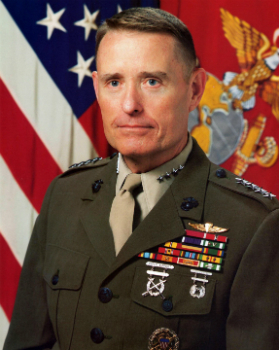
By Col. Butch Bracknell, USMC (Ret.)
Best Defense guest columnist
The Washington Post's obituary following the passing of General Carl E. Mundy, Jr., the 30th commandant
of the Marine Corps, could have benefited from some balance, perspective, and a
dose of journalistic ethics. The Post
can even make an obituary sensational. Writer Matt Schudel replows old dirt by
resurfacing controversies surrounding certain of General Mundy's public
statements. General Mundy, as a public figure, was of course not immune from
criticism, and this writer would even wager that, if asked, General Mundy would
want a do-over for certain public stances he took as commandant. Even so,
Schudel's research appears to have been Wikipedia deep, as a mere cursory
examination of the historical record might have led him also to note monumental
successes on General Mundy's watch.
Rather than dance on
the grave of an American icon, Schudel might have considered writing a more balanced
account of this gentleman-patriot's life. Over the history of the Corps, some commandants
have been divisive figures, but General Mundy is held in virtually universal
high regard. A warrior who fought in Vietnam at Khe Sanh and Con Thien, with a
gentleman's manner, General Mundy was revered by enlisted Marines, officers,
and his general officers. This author remembers seeing him at Camp Lejeune in
June 2012 at 0530 in the morning as he visited the base to attend the high
school graduation of one of his granddaughters (everyone knows when a
commandant is aboard your base) -- as trim as when on active duty, impeccably
dressed in pressed khakis, a collared golf shirt, clean-shaven with his hair
perfectly combed, returning from a vigorous morning walk. This was
quintessential Mundy -- the epitome of the image that Marine officers work to
project through appearance, carriage, and demeanor.
Schudel's portrait
of this deeply respected Marine leader was inappropriately one-sided. It
painted him with tones of bigotry, reciting his out-of-context comments
regarding African-American Marines's military skills without noting the
enormous progress in the Corps recruiting and retaining minority officers
during his watch. He recited in detail the controversy surrounding his comments
on proposing to limit Marines's right to marry until reaching the rank of sergeant
and women in combat, hinting at an anachronism, out of touch with modern times.
Schudel failed to touch General Mundy's deft guiding of the Corps through force
reductions that saw the Corps emerge from Desert Storm relatively healthier
than the other forces.
Foreseeing the
transition of conflict from state-on-state battles to irregular warfare against
shape-changing, unknown, and unpredictable state and non-state actors, often in
the global littorals, General Mundy steered the Corps in a direction that would
pay dividends for years to come. His tenure as a three- and four-star general
included manning, training, and equipping Marines to fight as a member of the
joint team that demolished the Iraqi Army in Desert Storm, provided
desperately-needed humanitarian relief in Somalia, accomplished the
perfectly-executed rescue of Air Force Captain Scott O'Grady in Bosnia, and
saved thousands of Kurdish lives in Operation Provide Comfort. As America
sought to reap an elusive "peace dividend" with shrinking defense budgets and
uncertain force structure, he guided the Corps through a period of
reorganization with a premium on adequate force levels and readiness that would
yield dividends in Afghanistan and Iraq after 9/11.
General Mundy was
the perfect commandant to follow General Al Gray. General Gray successfully
refocused the Marine Corps on its warrior ethos, and General Mundy carried the
baton forward to even greater levels of maturity, dignity, and professionalism.
Finally, General Mundy's dedication to the men and women of the armed forces transcended
his tenure as commandant, as he presided over the USO and the Marine Corps
University Foundation in retirement. Schudel could have learned all these facts
about General Mundy's successes as a general officer and as the 30th commandant
by picking up a phone and calling Headquarters, Marine Corps, or any Marine
over the age of 35. Instead, in America's paper of record, he elected to rely
on a handful of tired old saws about this fine American, with nary a nod toward
his true excellence in the art of generalship.
Articles like this
deepen the rift between America's warrior class and the self-styled Washington
elite. Marines are a tribe, one that endures valid, even-handed criticism with
a cheerful heart, so long as it is fair and objective. Attacking an icon like
General Mundy by surfacing the controversies of his tenure without placing them
in the context of his enormous strategic successes, on the other hand, raises
our hackles and reinforces the perhaps unwise and unhealthy perception of a
"we/they" split . "We" are the band of brothers, a fraternity forged in the
fire of combat, sacrifice, and service. "They" are Washington's comfortable
privileged class -- on Capitol Hill, in the administration, in the ivory tower
of the academy, and in the media. Most students of wholesome civil-military
relations know well that the split should not, and cannot, be so stark, and
that healthy civil-military relations require outreach and genuine
understandings from both sides. Yet offensive articles such as Schudel's
confirm some Marines's worst suspicions: Rather than take the time to author a
fair retrospective of General Mundy, including his monumental successes and
highly-visible gaffes, the Washington media would rather simply focus on the
latter, at the expense of a fair representation of his achievements.
The Corps does not
expect the media the handle its legacy with kid gloves. We expect to be held
accountable to the American people through several mechanisms -- civilian
control by the president and secretary of defense, congressional oversight, and
the occasionally harsh light of public scrutiny. We only demand that it be
fair, and that any institutional and individual failures be placed in proper
context. Matt Schudel felt no such need to be fair to General Mundy's legacy. This
author cannot speak for all Marines, but this Marine will never forget it.
Butch Bracknell
is a retired career Marine officer and member of the Truman National Security
Project's Defense Council.
Warning to military officers: Don't diss the cops in Monterey, CA, even in your home

They busted an Air
Force captain, a student at the Naval Postgraduate School, after he asked them why they were in his yard.
They later put a
warrant out on him, which may mess up his military career. It seems to me he is
owed a formal apology. This seems like one of those situations where a cop
arrested someone for not being fully respectful -- forgetting that respect is
earned by one's behavior, not owed.
And the cop was on
his property. In America, that counts for something. On the other hand, to
compound his alleged crime, the AF officer was wearing a hoodie.
April 11, 2014
FoW (24): The seven key ingredients of highly adaptive (and effective) militaries

By Col. Keith Nightingale, U.S. Army (Ret.)
Best Defense future of war entry
The there are two
great truths about the future of war.
The first is that it
will consist of identifying and killing the enemy and either prevailing or not.
We can surmise all sorts of new bells and whistles and technologies yet
unknown, but, ultimately, it comes down to killing people. It doesn't always
have to happen, but you always have to prepare to make it happen, and have the
other guy know that.
The other great
truth is that whatever we think today regarding the form, type, and location of
our next conflict, will be wrong. Our history demonstrates this with great
clarity.
Well then, how do we
appropriately organize for the next conflict if both these things are true? There
are a number of historical verities that should serve as guides for both our
resourcing and our management. In no particular order, but with the whole in
mind, here are some key points to consider that have proven historically very
valuable in times of war. The historic degree of support for any one or all
within the service structures usually indicated the strengths and shortfalls of
our prior leadership vision, preparation, and battlefield successes or failures
at the time.
TECHNOLOGY. This
should be heavily invested so our military is on the leading, not trailing edge
of warfare and its tools. It is a given that bad people and bad nations look to
new and unknown elements to provide a leading edge. It was only because of
FDR's instincts that we got a nuclear program ahead of the Germans. Conversely,
had they made earlier investments in jets and long-range submarines, we may
never have had a chance to use our newfound technology. Research &
Development is often shorted for budgetary reasons and is largely unseen and unappreciated
until the other guy's R&D work is demonstrated on the battlefield against
our people. Think IED and cyberwarfare.
INTELLIGENCE. There
can never be enough in enough different ways. Enough is never enough in this
area. This is especially true now with so many bright people, bright ways, and
asymmetric environments. Crucial to all this is HUMINT -- often a dirty word
because it involves risk and judgment -- but usually the only really truly
confirming data point a field commander has. The Iran rescue attempt would
probably have had a far different outcome had quality HUMINT been available.
QUALITY PEOPLE. From
the lowest to the highest grade, quality or lack thereof emerges with great
visibility in the opening period of any conflict. Ineffective organizations
from squad to corps and ships and planes are usually the result of a
disinterest in the stocking, training and education of those personnel and
things. In times of peace, military organizations tend to rest, be selective in
the workloads and if pinched for people, lower entrance standards or excuse
poor performance. People, especially quality people with societal options, cost
money. Within our system, cutting personnel and their costs is usually the
quickest way to achieve savings and the least politically dangerous. It is
always a proven false economy when warfare begins.
ECCENTRIC THOUGHT. Military
institutions traditionally abhor the eccentric. But in times of war, it is the
eccentric that shows the light to seemingly insurmountable problems and
provides field elements a priceless edge. Consider the World War II Higgins
Boat and ULTRA programs -- both were the brainchildren of people thought beyond
the pale by the conventional military of the time. All the services have
schools and "future think" programs that could harbor the unusual mind. There
are people within the population that seem to be in another universe and viewed
as distasteful by the system. But they may also hold the only flashlight for a
dark room problem besetting a combat zone. The services should create a small
place in their structure for these people and encourage their play. It has
always paid dividends.
LANGUAGE &
CULTURE. It's more than likely that our next war will be fought in a place we
don't now know where there is a language and culture we may not fully
understand. We will lose people because of that. There is also a distinct
possibility that the nature of that future fight will encompass civilians and
the necessity of convincing them as to our quality. The services need to
encourage and build on an internal knowledge base of great diversity, expertise,
and cultural flexibility. Some small node of that base will be priceless at a
critical moment. The crucial need is always at the cutting edge of human interface
-- a place where this sort of education is historically not taught in favor of
rote tactics. How much money did DOD have to spend to allow small units to
effectively work in our latest wars for translators and cultural support
personnel?
DEPLOYABILITY. The
most effective unit in our inventory is irrelevant if it can't get someplace in
time to make a difference. Historically, this is an area beset with specific service
agendas and is non-glamorous from a funding perspective. Amphibious lift and
air deployability have been traditional tail-end budget items for services
enamored with big ships and fast planes. It is highly likely that wherever our
next conflict is, it won't be in the United States. Getting there will be
important. Consider the heroic and somewhat amusing efforts it took to get land
combat units to Kuwait -- think Liberty Ships. If Saddam had been more
aggressive, our initial elements would have been speed bumps and their members
memorialized. We can do a lot better but it takes visionary discipline and
resources.
LEADERSHIP. Someone
will always be "in charge" at all levels. This is an oft-used phrase within the
military but not often truly defined or nurtured. Whatever the state of quality
our forces have at a moment of conflict, the existing leadership will make the
decisions and we will live with the results. McClellan or Marshall -- you get
what you got with what you developed. Truly defining this quality, determining
how to select quality and educating quality will be crucial. Leadership puts
all the above aspects into qualitative action -- or doesn't. Our success or
lack thereof will be determined by the quality of leadership at all levels at
the moment of commitment. Even without desired resources, future quality
leaders at all levels and tasks can have the vision and mindset to effectively
overcome issues, determine the most effective solutions, and inspire success. This
is the one area, above all, that cannot be neglected. Nor should we be
dependent on a momentary find of a personality that "doesn't fit the mold." Quality
will be demanded at all levels -- especially at the very top and bottom.
Leading in peace has
always been the greatest challenge for the services. The usual lodestones for
success do not exist. Proving the necessity for existence is always a major
budgetary challenge. The senior leadership is constantly trying to find the
Philosopher's Stone that turns a little into a lot. Leadership is further
hampered by both internal service pet rocks as well as congressional
proclivities. History indicates that the successful military Philosopher's
Stone can rarely be identified in the whole, but we do know some of the parts.
Col. (Ret.) Keith Nightingale commanded Airborne and
Ranger/SOF infantry forces from company through brigade. He participated in the
combat spectrum from the Dominican Republic through the Iran rescue attempt to
Afghanistan, as well as in drug interdiction operations in Latin America. He
annually conducts Normandy terrain walks for U.S. military participants in the
anniversary period.
Tom note: Got
your own list o f long-held truths about the future of war?
Consider submitting an essay
. The contest ends soon. Try to keep it short -- no more than
750 words, if possible. And please! no footnotes or recycled war college
papers.
One of the best military reading lists ever: Direct to you from the Australian army
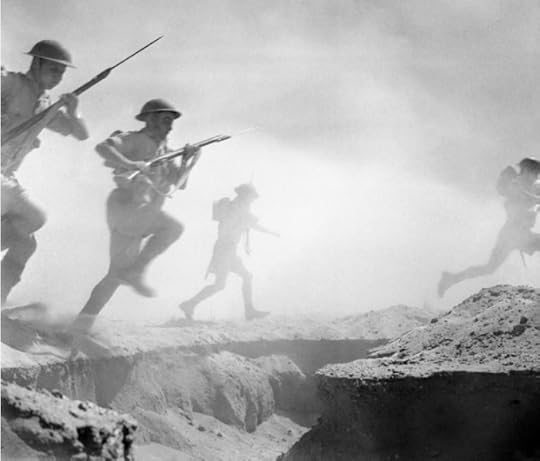
It's been awhile
since I've seen a reading list this good, and so comprehensive. An education itself. One
thing I especially like about it is that it doesn't just list books, it tells
you why you might want to read each one.
It also has some
very helpful introductory essays. For example, there is this comment on how to
read an official history:
Learn
to read between the lines, particularly the lines of the official histories.
Official historians expect their professional readers to be able to read
between the lines. For example in speaking of Singapore, the War Office history
says, 'Many stragglers were collected in the town and sent back to their
units.'
What
does this statement suggest? In an advance stragglers are to be expected. Men
become detached from their units for quite legitimate reasons. We provide for
them by establishing stragglers' posts to collect them and direct them back
towards their units. But when we get large numbers of stragglers behind a
defensive position, and a long
way back at that, it suggests that units have been broken up or that there has
been a breakdown of discipline somewhere. And that in turn suggests that the
general situation had reached the stage when a lot of people had lost
confidence, when morale was at least beginning to break down.
Also, General Paul
Van Riper's essay on his own professional education is worth an evening all by
itself.
April 10, 2014
Sherman's (VII) pet peeves: He loathed reporters, DC, politicians, and even JAGs
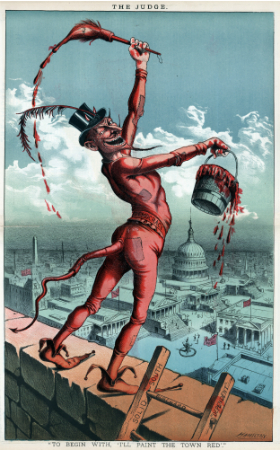
Everyone
knows that Sherman didn't want to run for
president, but I didn't realize how deep his loathing of politics overall ran.
This was despite his being the brother of a lifelong politician, John Sherman, who was a senator and
also secretary of the treasury and secretary of state.
In
April 1861, as the Civil War was getting under way, he was offered the post of
assistant secretary of war. He declined, responding, "I wish the Administration
all success in its almost impossible task of governing this distracted and
anarchical people."
In
1868, when President Andrew Johnson tried to transfer Sherman east from St.
Louis to Washington, Sherman said he'd rather retire from the Army. He
explained that he found the idea of moving to Washington "highly objectionable,
especially because it is the political capital of the country, and focus of
intrigue, gossip and slander."
Underscoring
his objection, he wrote to Grant that if the president and Congress would just
shut up and go to sleep, "the country would ... recover far faster."
Another
pet peeve was reporters. "Newspaper correspondents with an army, as a rule, are
mischievous. They are the world's gossips, pick up and retail the camp scandal,
and gradually drift to the headquarters of some general, who finds it easier to
make reputation at home than with his own corps or division."
As
for JAGs: "The presence of one of our regular civilian judge-advocates in an
army in the field would be a first-class nuisance, for technical courts always
work mischief."
By
the way, the general is tweeting his march through Georgia at @TecumsehSays. Typical tweet: "Went well, had some fun, burned
some stuff, you know, the usual."
The top 10 lies Pakistani officials tell
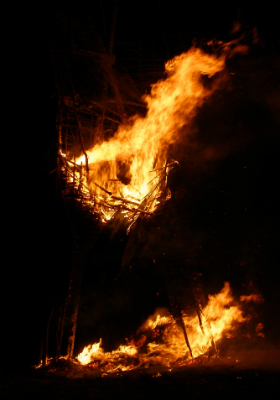
From
the tell-it-like-it-is Prof. Christine Fair. No. 1 is, "Our
relationship should be strategic rather than transactional." Second is that it
is us, not them, that has been an unreliable ally.
Here
is a link to the rest.
What stolen valor incidents tell us about frayed ties between military and society

By Maj.
Brad Hardy, U.S. Army
Best
Defense guest columnist
A recent news story by KSL-TV in Salt
Lake City linked to by the Stolen
Valor Facebook page reported on a military
fraud named Kenneth Crocheron. With kindness in his heart, Crocheron posed as a
Special Forces officer in an attempt to bring comfort to a local boy stricken
with a rare disease. It was a touching intent, but with a misguided method. Crocheron's
lie about current military service grew and his backstory expanded to a
breaking point. The ill boy's family investigated and outed Crocheron as a
fake.
At least one has to admire
Crocheron's boldness. Just one look at his broad, goofy smile belies anything
but a man convinced no one would call him on it. Maybe he assumed the veterans
in his midst were too timid to say anything and his Gaddafi-esque collection of awards would dazzle the uninformed civilian. Crocheron's
pictures are hilarious and tragic at the same time, and they should make the soldiers
laugh and cringe at the absurdity. Further, his story of stolen valor and many
others like it show a disconnection between trust in the military and an
understanding society.
Crocheron's story went on for some
time, at least since 2007. And cases of stolen valor are nothing new. But, for something like this to go on as long
as it did says two things about our society. First, it indicates that the Army
remains a trusted and admired profession, but almost to a fault. The Army's
manual on the Profession of Arms, Army Doctrine Reference Publication (ADRP) 1,
states that "trust reflects the confidence and faith that the American people
have in the Army to effectively and ethically serve the Nation, while resting
assured that the Army poses no threat to them." A broad assumption is that
civilians will tend to defer to the military to do the right thing. Maybe it's
the professed values, generally honorable conduct in war, authoritative tone,
uniform, haircuts, or heroic portrayal in movies. But jokers like Crocheron,
even if unaffiliated with the Army, erode that earned trust. Society may start
to second-guess the confidence and question their faith that ADRP 1 touts. The
Crocherons of the world destroy public trust in the Army by exploiting it. He
abused it to gain unearned prestige and access to a family's young child. The next time that family
sees a uniformed servicemember, they may not be so supportive. The next
civilian that reads about another case of stolen valor may not believe the
legitimate war stories of real returning soldiers.
Now the critical observer may assert
that the Army has nothing to do with the likes of Crocheron or similar phonies.
This is certainly true. The Army is in the awkward position of defending this
skewed sense of the freedom
of speech. But the service does not want these
crooks to besmirch its proud tradition and uniform. Only an active citizenry that
knows its military and, further, desires to keep trusting it may be the one
bulwark against a bad reputation.
This is the second point. This event
shows that society may have only a passing knowledge about its military,
uniforms, combat operations, and history. For many, these aspects of military
culture remain esoteric and distant, only showcased in commercials and parades.
It's not an indictment, but perhaps shows just how separated the armed forces are from the society it serves. Crocheron
could have served in both Vietnam and Afghanistan as he claimed. It's been done
before. But no one questioned the claim's feasibility. No one thought
how odd a one week deployment to Afghanistan sounded. The gestalt of his
uniform's disorganized appearance raised no red flags until much later. No one
knew until a veterans group said everything was a scam.
This situation demands that the
civilian population grows to know the military they fund and send to war on its
behalf. Civilians should do it, if not to prevent the short-term embarrassment
of deception, than to grasp what their long-term defense investment is. But
also, it indicates that the Army has not done such a great job at advocating
its own culture in way that civilians know enough to spot imposters.
Blindly accepting claims of military
service can make innocent citizens look or feel foolish and resentful. Further,
near-automatic deference, confidence, and faith in a powerful institution,
instead of thoughtful questioning and examination of its actions and intent,
are dangerous attitudes. Objective critical examination of the government and
its agencies feels pretty darn patriotic and serves as a sound civil
responsibility. With a closer look, the citizen may be pleased to learn of lost
stories of heroism that were ultimately honored. But one's fear may be that the civilian would not like what he
finds, such as the seedy actions of some our senior
leadership. It is only through this regular
examination that society will gain a greater understanding and appreciation of
its military and perpetuate the trust it needs for legitimacy. Without trust
and legitimacy, the Army becomes an army.
I would be encouraged if the casual
man on the street knew so much about the military he funds. I want him to, and
hope my brothers- and sisters-in-arms continue to tell the good Army story. But
my fear is that, all too often in the mind's eye, the Army is relegated to pop
culture concepts and tear-jerking redeployment reunion videos. If the Army
continues to act either only ‘over there' in a way that allows the general
population to remain unaffected, or on a cloistered installation, or with an
indecipherable acronym language, indifference will continue. Choruses of "thank
you for your service" will suffice as proper homage, much like attending church
at Christmas and Easter constituted the religious experience of my youth.
I am reminded of the tale of the wolf, sheepdog, and sheep. The story goes that the Army
is the sheepdog, protecting the sheep (citizens), from the wolf or those who
would do the sheep harm. It is very encouraging to the soldier and may touch him
with bit of hubris. But I think that we need more sheepdogs geared toward
another form of guard duty. We need more sheepdogs examining the military and
the policy we fulfill. We need more civilian sheepdogs that are on the watch
for the phony as well as on guard for Army culture.
However, the
greatest onus to make a difference is on the Army. No matter how special we may
think we are, the Army really is not so different and separate an organization.
As a part of society, the Army must do better at educating the society it
serves about its culture so that future scam artists are detected. The Army
must continue to share its culture, as it is part of the broader fabric of
American heritage. The military and American experiences have always combined
to make us who we all are and show where we have been as a society. So, fellow
sheepdogs, let's not let the two drift too far apart.
MAJ Brad Hardy is a U.S. Army officer, Functional Area 59 (Army
Strategist), and unapologetic University of Akron alumnus and Akron Zips fan.
The opinions expressed in the article are solely those of the
author and do not reflect those of the U.S. government, the Department of
Defense, or the U.S. Army.
April 9, 2014
The real question isn't naval presence but how to best empower U.S. partners in Asia

By
Captain Paul Lushenko, U.S. Army
Best Defense guest respondent
No one
questions the U.S. Navy's utility. The issue at stake, however, is how to
achieve the best balance between the services to (1) provide for regional
security and order while (2) meeting America's security obligations to its
allies and partners, especially Australia, Japan, and South Korea. While the
Navy, as both a ‘way' and ‘means,' as you point out, can help achieve both
‘ends,' your analysis is parsimonious to the point of obfuscating, particularly
the diplomatic or messaging dividends of deploying land-based forces across the
region.
In a
region beleaguered by a mélange of threats and vulnerabilities, epitomized by
North Korea's increasingly brazen machinations and natural disasters
respectively, the Navy can't do it all
or by itself. Here, think of the U.S. Army's equally important response to
Japan's 3/11 or its live-environment training exercises on the Korean Peninsula
that do much to reassure regional-states -- again, especially allies -- of
America's staying power.
Among
other things, the dispatch of land-based forces is designed to placate allies
and partners as well as deter potential challengers, namely the Chinese
party-state on account of its reputed revisionism. All of these actors
increasingly question the viability of America's so-called ‘pivot' or rebalance
towards the Indo-Pacific. Such uncertainty is based not only on sequestration
and its attendant spending caps, but the recent denigration of U.S. soft power
given the country's failures in Iraq and Afghanistan and its frustrated
management of global security challenges including Syria's implacable civil war
and Russia's annexation of Crimea. If you don't believe me, perhaps you'll
appreciate this recent article published by the New York Times, titled "U.S. Response to Crimea Worries Japan's
Leaders."
Moreover,
because the Navy is not necessarily omnipresent -- unlike you, I disagree that
the Navy can be everywhere at once on the basis of simple math, logistics, and
manning -- land-based forces provide a tangible and stable deterrent. Do you
think North Korea or China's provocations would be lessened if the Pentagon removed
land-based forces on the peninsula and in Okinawa, respectively? Do you think
Russia might also abrogate its competing claims to the Kuril Islands vis-à-vis
Japan as well?
The
answer is no. Such redeployment would undermine America's regional hierarchy or
"hubs and spokes" alliance system that has provided security throughout Asia
since WWII, attenuate any offshore-balancing thereafter, and encourage more
insouciance regarding the procedural norms that frame regional and
international order, including sovereignty and territorial respect. Within a
regional context, this is a damning proposition given that it would countermand
or unravel the intent of especially Southeast Asian states to shepherd a
security order based on consensus and consultation. Since its promulgation in
1967, the Treaty of Amity and Cooperation, published by the Association of
Southeast Asian Nations or ASEAN, has provided the basis for resolving regional
challenges like competing irredentist claims or lingering war memories through
cooperative and diplomatic measures. With respect to 'HADR' missions on the
other hand, who do you think provides the situational awareness and collects against
intelligence requirements that focuses the Navy's presence and assistance? That's
right, land-based forces.
What
frightens me about your analysis, notwithstanding that it is informed by a
recent deployment throughout the antipodes, is that it may actually represent a
standing position among at least a segment of the Navy. While I concur that
funding amid sequestration should be tailored against the most important
capabilities, your position represents a veritable gutting of one aspect of the
hard-power component of America's rebalance, albeit an important one -- the U.S.
Army. Meanwhile, your argument is myopically focused on what America provides
the region in terms of materiel, training, and so forth. The more astute point
would have been, especially given ongoing shifts in the regional security order
embodied by China's "peaceful rise," how America can best deputize its regional
allies and partners. Put differently, what can and should policymakers and
senior leaders expect from allies and partners by way of burden-sharing? To me,
this seems the more important issue given that, amid a probable continuation of
sequestration, such a broader distribution of security responsibilities enables
longevity of American influence across the region largely unencumbered by
fiscal constraints.
Finally,
I think you should have focused on the ‘joint' pay-offs of investing in both
the Army and Navy. Recall, seven of the world's 10 largest armies are
positioned within the Indo-Pacific. Does investing in the Navy alone achieve
parity with these forces, especially if it is blinded or ‘fettered' by the
China's anti-access strategy? No.
In the
event of a states-based conflict, you'll appreciate that the historical trend
has been that nothing is won until it is occupied. Admittedly, the wars in Iraq
and Afghanistan have demonstrated that even this paradigm is now subject to
scrutiny, particularly given a movement towards ‘armed politics,' whereby great
powers pursue military action more as policy than to condition political
objectives. Nevertheless, it seems that victory (definitions of this hotly
contested word aside) is predicated on occupation, something that the Navy,
based on its mission and training (the Marine Corps is fundamentally about
gaining a lodgment) cannot and will not provide.
In the final
analysis, I think you failed to realize that we are as much brothers-in-arms as
we are services-in-arms.
Best of
luck and stay safe.
Paul
Captain Paul Lushenko is the Commander of Headquarters and Headquarters Company, 502D Military
Intelligence Battalion, assigned to the 201st Battlefield Surveillance Brigade
at Fort Lewis, Washington. He is a Distinguished Honor Graduate of the U.S.
Military Academy and holds a Master of Arts in international relations and a
Master of Diplomacy from the Australian National University. Capt. Lushenko is a friend of
Lt. Robb
, who was his twin brother's roommate at the U.S.
Naval Academy. The views expressed in this article are those of the author and
do not reflect the official policy or position of the U.S. Department of the Army, Department of
Defense, or government.
Why Sherman (VI) preferred volunteers
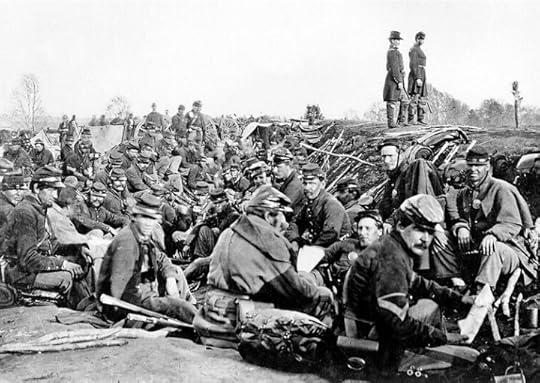
General Sherman ranks volunteers, draftees, and subs: "I think all officers of
experience will confirm my assertion that the men who voluntarily enlisted at
the outbreak of the war were the best, better than the conscript, and far
better than the bought substitute."
Lee surrendered to
Grant on this day.
Churchill denounces fighting the Afghans but concludes my empire, right or wrong
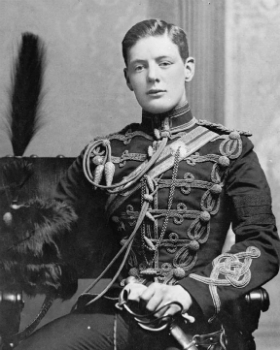
In 1897, Winston
Churchill wrote to his mother summarizing his views of the British fighting the
Afghan tribes: "Financially it is ruinous. Morally it is wicked. Militarily it
is an open question, and politically it is a blunder." But, he continued,
according to Con Coughlin's new book, Churchill's
First War, "we can't
pull up now." He emerged more determined than ever to defend the British
Empire.
Speaking of cleaning
up the detritus of the British Empire, the president of Ireland is making the first-ever state visit to Britain by an Irish head of state.
Thomas E. Ricks's Blog
- Thomas E. Ricks's profile
- 437 followers



